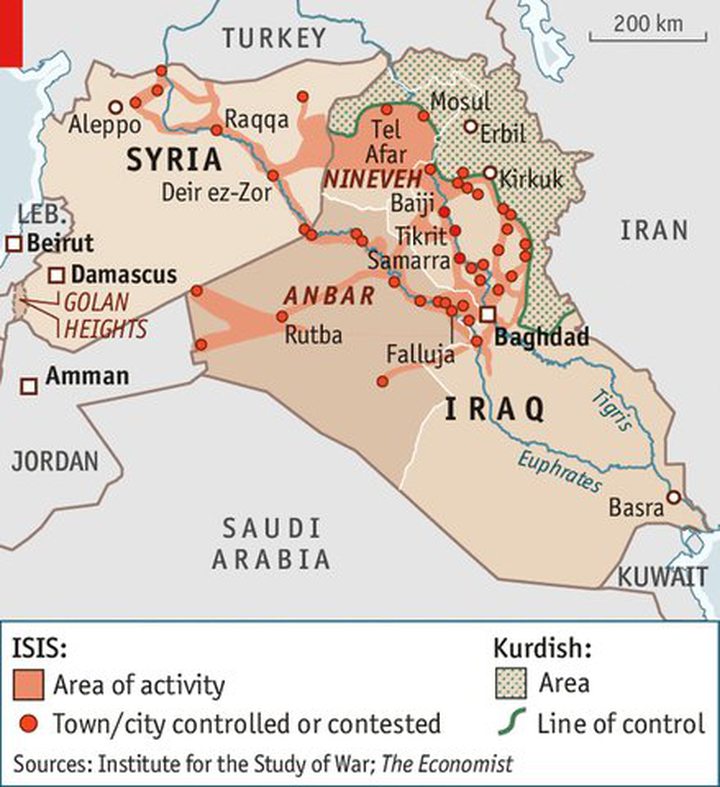The War for Iraq

AS THE jihadists of the Islamic State of Iraq and Greater Syria (ISIS) rebrand themselves more simply as the Islamic State (IS), heralding an eventual global caliphate that knows no borders, they continue to secure swathes of territory in northern and western Iraq, with Baghdad in their sights. Most of the main frontier crossings from Iraq to Jordan and Syria are controlled by the IS or its tribal allies. The province of Anbar, to the west of Baghdad, and most of Nineveh, surrounding Mosul, remain in their hands.
But the generals commanding Iraq’s regular army are girding themselves for a fightback, picking towns north of Baghdad that they must defend or take back in order to turn the tide against the jihadists. These include Baiji, the site of one of Iraq’s biggest oil refineries; Tikrit, the birthplace of Saddam Hussein; and Samarra, whose Askar shrine is one of the holiest to Shias, the sectarian base of support for the beleaguered government of Nuri al-Maliki. At the same time, Mr Maliki, whose coalition won easily the most seats in a general election in April (but not enough for an outright majority), is fighting a political battle for his own survival as prime minister against disgruntled fellow Shias as well as Sunni Arabs and Kurds, who have long yearned to see the back of him.
On the military front, his forces seem to have won a rare victory by holding Baiji after a battle lasting a week. Special forces and counter-terrorism units, intensively trained by the Americans before they left at the end of 2011, apparently led the fight. Small teams of American advisers, back in Iraq at the urgent behest of Barack Obama, may have tipped the balance. A battle for Tikrit was still, as The Economist went to press, in the balance. And the IS is within artillery range of Samarra. American military advisers are involved in plans to ensure that the city does not fall. The broader aim is to secure an arc of defence to the north and west of Baghdad.
Nineveh and Mosul, its capital, are beyond the reach of Iraq’s security forces, which fled from that area in the face of ISIS a month ago. But Kurdish forces, known as the Peshmerga, determined to defend their own autonomous region in the north and east, have begun to fight the IS along the border between Kurdistan and Nineveh.
From a new operations centre in Baghdad, American officers view images supplied by surveillance drones to help the Iraqi army identify IS targets. America has urgently dispatched Hellfire missiles to Iraq, but with only two converted Cessna aircraft to fire them from, Russia is providing more lethal air power. The first five of 12 Sukhoi SU-25 fighter jets rushed to Iraq have taken to the skies. The Iraqi authorities deny that the pilots are Russian.
The Americans are said to hold in reserve the option of launching their own air strikes against the IS, using facilities in the Gulf. The most tempting targets are IS training camps and supply lines along the Iraqi-Syrian border. But Mr Obama’s people say no to heftier military aid unless Mr Maliki forms a less sectarian government, to include Sunnis and Kurds in senior posts.
The collapse of the Iraqi army in the north has already given greater clout to Iraqi Shia militias such as Asaib Ahel al-Haq, trained and to some extent directed by Iran. But many Baghdadis, though fearful of IS’s advances, are also worried that the return to prominence of Shia militias could presage a sectarian bloodbath on the scale seen in 2006-08. Killings of Sunnis in Baghdad districts under the control of Shia militias are said to have resumed.
Tension is also rising between Mr Maliki’s people and the Kurds, who stepped in to grab disputed territory, including the city of Kirkuk, as the Iraqi army fled before ISIS last month. At the first session of the new Iraqi parliament on June 1st most Kurds walked out after members of Mr Maliki’s coalition called them traitors.
A call by Grand Ayatollah Ali al-Sistani, Iraq’s most influential Shia cleric, for politicians of all parties forthwith to form a new government went unheeded. But the politicking is proceeding apace. A former vice-president, Adel Abdul Mahdi, and a former deputy prime minister, Ahmed Chalabi, an American favourite in exile who turned against his sponsors once he was back in Baghdad, are said to be jostling for the top job. Meanwhile Mr Maliki is looking nervously to the north and west. Unless his army fends off the jihadists, there will be no job to be had.





